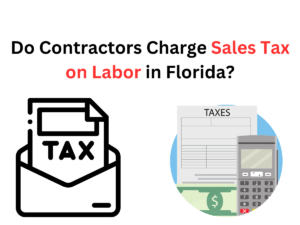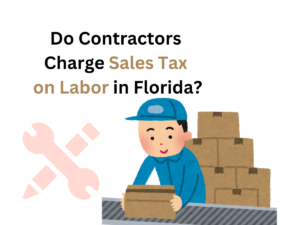When hiring a contractor in Florida, one of the most common questions that arise is whether sales tax is applied to labor costs. Understanding the tax implications of contracting work is essential for both contractors and their clients, as it can significantly impact the overall cost of a project.
In Florida, the rules surrounding sales tax on labor can be complex, and they vary depending on the type of work being performed, the nature of the contract, and the materials used. This article will explore the nuances of sales tax on labor in Florida, providing clarity for contractors and consumers alike.


Understanding Sales Tax in Florida
Sales tax is a consumption tax imposed by the state of Florida on the sale of goods and certain services. As of 2023, the state sales tax rate in Florida is 6%, though local jurisdictions may add additional taxes, bringing the total rate to as much as 8.5% in some areas. While sales tax is typically associated with the purchase of tangible goods, it can also apply to services, including labor, under specific circumstances. In Florida, the general rule is that sales tax is not charged on labor alone. However, there are exceptions to this rule, particularly when labor is part of a larger transaction that includes the sale of materials or tangible personal property. To determine whether sales tax applies to labor, it is important to distinguish between “real property” and “tangible personal property.”
Real Property vs. Tangible Personal Property
The distinction between real property and tangible personal property is crucial in understanding Florida’s sales tax laws.- Real Property: Real property refers to land and anything permanently attached to it, such as buildings, structures, and fixtures. Improvements to real property, such as construction, remodeling, or repairs, are generally not subject to sales tax on labor. However, sales tax may apply to the materials used in these projects.
- Tangible Personal Property: Tangible personal property includes physical items that can be moved, such as furniture, appliances, and equipment. When labor is performed on tangible personal property, such as repairs or installations, sales tax may apply to both the labor and the materials.
When Is Sales Tax on Labor is Charged in Florida?
In Florida, sales tax on labor is typically charged in the following scenarios: Repair, Maintenance, and Installation Services: If a contractor is hired to repair, maintain, or install tangible personal property, sales tax is generally applied to both the labor and the materials. For example, if a contractor is hired to repair an air conditioning unit or install a new appliance, sales tax would apply to the total cost of the service, including labor. Mixed Transactions: In cases where a contract includes both labor and materials, and the labor is incidental to the sale of materials, sales tax may apply to the entire transaction. For instance, if a contractor is hired to install a new roof, the labor is considered incidental to the sale of the roofing materials, and sales tax would apply to the total cost. Fabrication Labor: If a contractor is engaged in fabricating tangible personal property for sale, sales tax may apply to the labor involved in the fabrication process. This includes custom-made items such as cabinets, countertops, or signage. Service Contracts: Some service contracts, such as maintenance agreements for equipment or appliances, may be subject to sales tax on the labor portion of the contract. However, this depends on the specific terms of the contract and the nature of the services provided.When Is Sales Tax on Labor Not Charged in Florida?
Sales tax is generally not charged on labor in the following situations: New Construction: Labor performed in connection with new construction, including the building of homes, commercial structures, or other permanent improvements to real property, is not subject to sales tax. However, sales tax does apply to the materials used in the construction process. Remodeling and Repairs to Real Property: Labor for remodeling, repairing, or improving real property is typically exempt from sales tax. For example, if a contractor is hired to remodel a kitchen or repair a roof, sales tax would not apply to the labor but would apply to the materials. Architectural and Engineering Services: Professional services such as architectural design, engineering, and surveying are not subject to sales tax, as they are considered intangible services rather than labor on tangible property. Landscaping and Lawn Care: Labor for landscaping, lawn care, and similar services is generally exempt from sales tax, as these services are considered improvements to real property.How Contractors Handle Sales Tax on Labor?
Contractors in Florida are required to collect and remit sales tax on taxable transactions. To comply with state tax laws, contractors must: Register for a Sales Tax Permit: Before conducting business, contractors must register with the Florida Department of Revenue to obtain a sales tax permit. This permit allows them to collect sales tax from their customers. Determine Taxable Transactions: Contractors must carefully assess each project to determine whether sales tax applies to the labor and materials. This requires a clear understanding of the distinction between real property and tangible personal property, as well as the specific rules for different types of services. Separate Labor and Materials on Invoices: To ensure accurate tax reporting, contractors should itemize labor and materials separately on invoices. This helps clarify which portions of the transaction are subject to sales tax. Remit Sales Tax to the State: Contractors are responsible for remitting the sales tax they collect to the Florida Department of Revenue on a regular basis, typically monthly, quarterly, or annually, depending on their sales volume.Exemptions and Special Cases
There are certain exemptions and special cases where sales tax on labor may not apply, even in situations where it would typically be required. For example: Government and Nonprofit Organizations: Contracts with government entities or nonprofit organizations may be exempt from sales tax, depending on the nature of the work and the specific exemptions granted by the state. Resale Transactions: If a contractor purchases materials for resale to a customer, sales tax is not applied at the time of purchase. Instead, the customer is responsible for paying sales tax on the final sale. Manufacturing Exemptions: In some cases, labor involved in the manufacturing process may be exempt from sales tax, particularly if the end product is for resale.Common Misconceptions About Sales Tax on Labor
There are several misconceptions about sales tax on labor in Florida that can lead to confusion for both contractors and consumers: All Labor Is Taxable: Many people assume that all labor is subject to sales tax, but this is not the case. Only labor performed on tangible personal property or incidental to the sale of materials is taxable. Contractors Always Include Sales Tax in Their Quotes: Some contractors may include sales tax in their quotes, while others may list it separately. It is important for consumers to clarify whether sales tax is included in the quoted price. Sales Tax Applies to All Construction Projects: While sales tax applies to materials used in construction projects, labor for new construction and improvements to real property is generally exempt.
Tips for Consumers
For consumers hiring contractors in Florida, it is important to: Ask About Sales Tax on Labor: Before signing a contract, ask the contractor whether sales tax will be applied to the labor and materials. Request a detailed breakdown of the costs. Verify the Contractor’s Sales Tax Permit: Ensure that the contractor is registered with the Florida Department of Revenue and has a valid sales tax permit. Review the Contract Carefully: Make sure the contract clearly specifies which portions of the work are subject to sales tax and which are exempt.Is There a Sales Tax Implication for Charges Made by Connected Technologies for Labor in Florida?
In Florida, sales tax implications for charges made by connected technologies and your payments can vary based on the nature of the service provided. It’s essential to discern if the labor is directly associated with tangible goods, as this can influence tax obligations. Always consult a tax professional for clarity.
